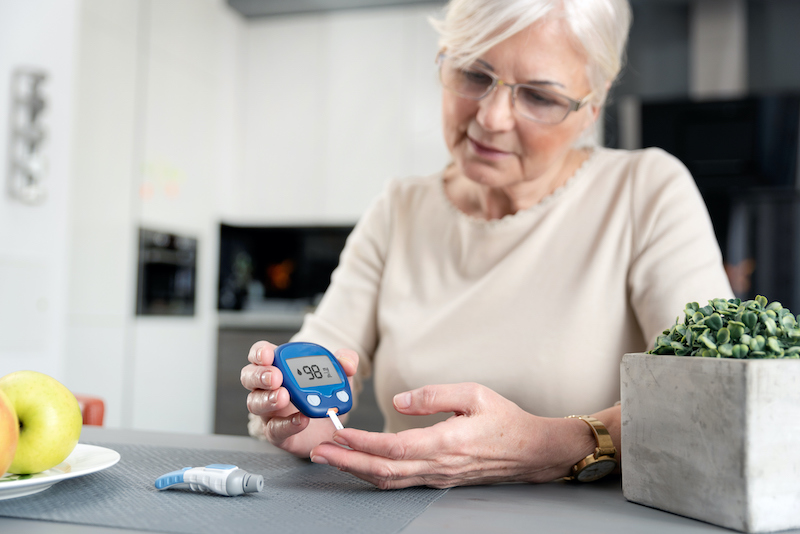
Manage diabetes in the elderly by following these easy tips.
Checking glucose levels. Injecting insulin. Carefully watching your diet. If this describes a typical day in your life, or that of an older adult you love, you understand firsthand the challenges that come with a diagnosis of diabetes in the elderly. As November is Diabetes Awareness Month, the aging care team at At-Home Care Company is pleased to share the following important information every diabetic – and every family member who cares for one – should know.
What Does It Mean to Have Diabetes?
Simply speaking, our bodies convert a number of the foods we eat into glucose, which provides the energy we need – but only if our bodies make an ample amount of the hormone insulin to break down the glucose for our cells to be able to access it. Diabetics’ bodies are either not able to make enough insulin (type 1 diabetes), or aren’t able to use the insulin correctly (type 2 diabetes), bringing about too much glucose in the blood.
Left untreated, diabetes could lead to severe health problems, such as eye, kidney, and nerve complications, heart disease and stroke, and in some cases an increased risk for Alzheimer’s or cancer.
What Are the Symptoms of Diabetes in the Elderly?
Many individuals with type 2 diabetes have such mild symptoms, or symptoms that come and go, that they don’t even recognize there’s an issue until the disease progresses and symptoms intensify. Signs to watch out for include:
- Exhaustion
- Increased hunger and/or thirst
- Loss of weight
- Blurred vision
- Frequent urination
- Slower healing of cuts and bruises
- Skin infections
It is important to consult with the physician if any of these symptoms become evident.
Can Diabetes Be Managed?
The good news is, once diagnosed and effectively treated, and with adherence to changes in lifestyle, it’s possible to effectively manage diabetes in the elderly. For some, changes to exercise and diet are sufficient, while other individuals will need insulin injections and/or medication.
Your doctor will put together a diabetes management plan to follow, which could include:
- When and how to track sugar levels
- Which foods to consume and which to avoid
- Exercises and physical activities
- A medication regimen
Strategies to optimize health while managing diabetes include:
- Manage your blood pressure levels and cholesterol, and have them checked on a frequent basis.
- If you smoke, quit.
- Get annual flu and pneumonia vaccines, along with annual eye and kidney exams.
- Check the feet every day to look for red patches, sores, calluses, blisters, as well as other skin irregularities and see a podiatrist with any concerns.
- Keep skin protected, clean, and moisturized.
- Ask your physician for recommendations on cancer screenings, and for help with any other physical, emotional, or mental health concerns being experienced.
At Home Care Company, a provider of senior care in Des Moines, IA and the surrounding areas, can help those diagnosed with diabetes in a variety of ways, including transportation to medical appointments and procedures, meal planning and preparation in accordance with dietary restrictions, medication reminders, and much more. Reach out to us at (515) 292-2650 for a no-cost in-home consultation and additional details on our trusted senior care in Des Moines, IA and the surrounding areas.
